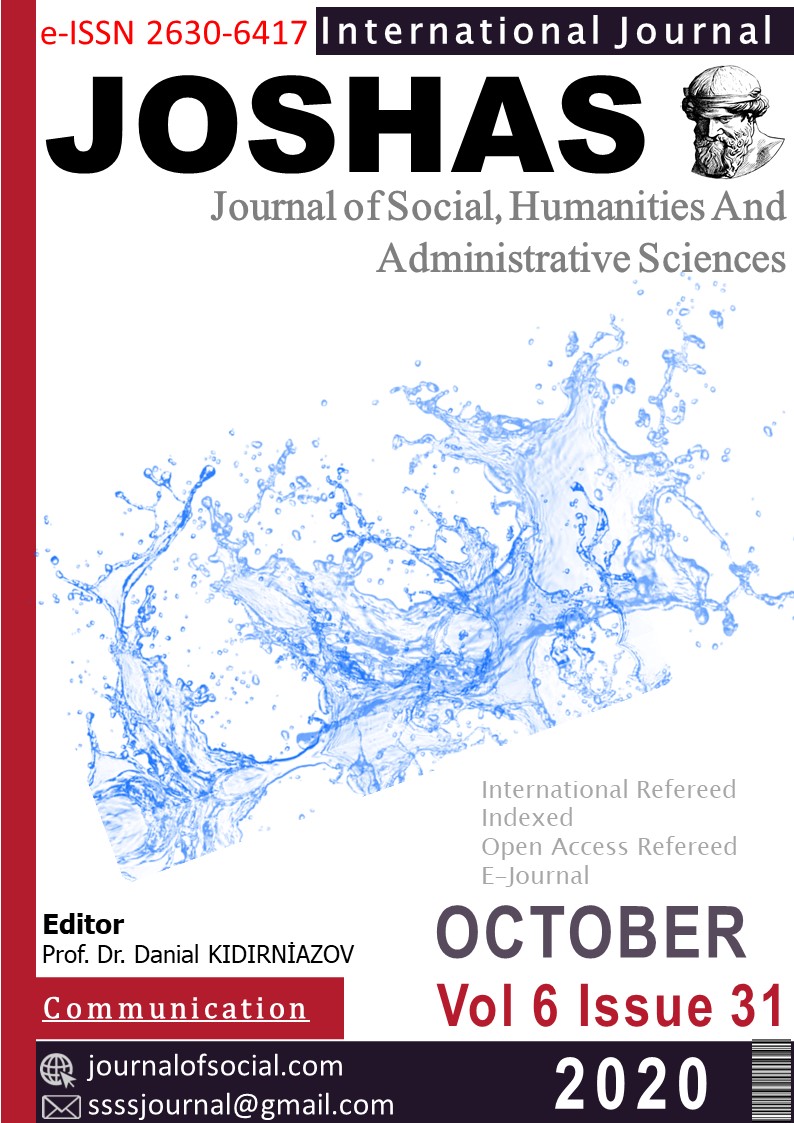Author :
Abstract
Tüm dünyayı etkisi altın alan Covid-19 salgını dünyada genelinde milyonlarca kişinin virüse yakalanması ve yüzbinlerce kişinin de ölümü ile etkisini göstermeye devam etmektedir. Dünya Sağlık Örgütünün bunu bir pandemi ilan etmesinin hemen ardından tüm ülkeler gibi Türkiye’de 16 Mart 2020 tarihinde birçok radikal karar alarak virüsün yayılmasını önlemeye çalışmıştır. Bu süreçte; okullar kapatılarak online eğitime geçilmiş, uzaktan çalışma uygulamaya konulmuş, 18 yaş altı ve 65 yaş üstüne sokağa çıkma yasağı getirilmiş, Ramazan bayramı ile hafta sonu tatillerinde sokağa çıkmak yasaklanmış ve daha birçok önlem uygulanmaya başlanmıştır. Bu süreç tüm toplumsal gruplar için çeşitli sorunları da beraberinde getirmiştir. Kuşkusuz pandemi sürecinden en fazla etkilenen gruplar arasında kadınlar da bulunmaktadır. Kadınların koronavirüs günlerindeki ev içi yaşamını incelemek amacıyla nicel bir çalışma gerçekleştirilmiştir. Çalışma 18-30 Mayıs 2020 tarihleri arasında 413 kadının katılımıyla Google formlar üzerinden yapılmıştır. Katılımcılara Facebook, whatsapp ve e posta yoluyla ulaşılarak anket formunun linki verilmiştir. Çalışmanın temel bulgularına göre, salgın öncesinde de çoğunluğu kadınlar tarafından yapılan ev içi işlere(yemek, bulaşık, çamaşır, ütü, çocukların bakım ve ödevlerine yardım ve temizlik vb.) ayırdıkları sürelerde artış meydana gelmiş, buna eve alınan ürünlerin hijyeni için harcanan süreler eklensiğinde kadınların iş yükleri aşırı şekilde artmıştır. Diğer önemli bir bulgu da uzaktan çalışmak zorunda kalan özellikle küçük çocuğu/ okul çağında çocuğu olan annelerin yaşadığı ikili hatta üçlü rollerini aynı anda oynamaktan kaynaklı sorunlardır. Sayıları çok fazla olmasa da kadınlar ilk defa salgın sürecinde eşlerinden şiddet gördüklerini ve eşiyle yaşadıkları tartışmaların arttığını söylemişlerdir. Bu süreçte kadınların deneyimleri ailesel rollerle sınırlı kalmış, iş verimlikleri düşmüş, uyum ve sağlık sorunları yaşamışlardır.
Keywords
Abstract
The Covid-19 epidemic, which emerged in December 2019, affected the whole world, caused millions of people to catch the virus and the death of hundreds of thousands of people worldwide. After World Healh Organization decleared it as pandemic, Turkey as many other countries has taken various radical decisions to prevent the virus from spreading. In this process, schools were closed and online education was started, remote work was put into practice, a curfew was imposed for those under 18 and over 65 years of age, the curfew was imposed during Ramadan and weekend holidays, and many other pracautions were taken. This process brought along various problems for all social groups. Undoubtedly, women are among the groups most affected by the pandemic process.The study was conducted between 18-30 May 2020 by using Google forms, with the participation of 413 women. Participants were sent a link to the questionnaire form via Facebook, WhatsApp and e-mail. According to the main findings of the study, there has been an increase in the time allocated to domestic work (cooking, washing, washing, ironing, helping children with care and homework, etc.), mostly done by women before the epidemic. In addition to these domostic works, with the time spent for the hygiene of the products taken to the house, the workload of women has increased dramatically. Working remotely has been particularly challenging for mothers with young children / school-age children because of the increasing domestic workload of women. The women participating in the study emphasized that concepts such as working day, working hours and lunchbreak have disappeared, and it is difficult to define the boundary between housework requirements and occupational requirements. Although not many, some participants stated that for the first time they were subjected to violence by their spouses during the epidemic and that their discussions with their spouses increased. It is among the findings of the study that in this process, women's experiences are limited to familial roles, their work efficiency decreases, and they experience an increase in adjustment and health problems.
Keywords
- Alon, T., Doepke, M., Olmstead-Rumsay, J., Terlit, M. (2020). The Impact of COVID-19 on Gender
- Alon, T., Doepke, M., Olmstead-Rumsay, J., Terlit, M. (2020). The Impact of COVID-19 on Gender Equality, https://www.nber.org/papers/w26947.pdf erişim tarihi 9.8.2020
- Alpar, B.I. (2020). Covıd-19 Salgın Sürecinde Kadın Ve Hane İçi Emeği, Covıd-19 PandemisininEkonomik, Toplumsal ve Siyasal Etkileri, Editörler: Dilek Demirbaş, Veysel Bozkurt, Sayım Yorğun, İstanbul: İstanbul Üniversitesi Yayınları
- Ayanoğlu, Z. N(2020). Karantina Belleği: Ev İçi Emeğe Radikal Feminist Bakış, Birikim, https://www.birikimdergisi.com/guncel/10168/karantina-bellegi-ev-ici-emege-radikal-feminist-
- https://www.unwomen.org/en/news/stories/2020/4/statement-ed-phumzile-violence-against-women- during-pandemic erişim tarihi 14.08.2020
- Bozkurt, V. (2020). Salgının Belirsizliği Huzursuzluğu Artırdı. https://www.hurriyet.com.tr/amp/yazarlar/sibel-bagci-uzun/salginin-belirsizligi-huzursuzlugu-
- artirdi-41501744 erişim tarihi 1.05.2020.
- Bozkurt, V.(2020). Pandemi Döneminde Çalışma: Ekonomik Kaygılar, Dijitalleşme Ve Verimlilik,Covıd-19 Pandemisinin Ekonomik, Toplumsal ve Siyasal Etkileri, Editörler: Dilek Demirbaş, Veysel Bozkurt, Sayım Yorğun, İstanbul: İstanbul Üniversitesi Yayınları
- Bradbury, C., Jones, RN., Isham, L.(2020)he Pandemic Paradox: The consequences of Covid-19domestic violence, Journal of Clinical Nursing https://onlinelibrary.wiley.com/doi/epdf/10.1111/jocn.15296, erişim tarihi 9.08.2020
- Canatan, A.(2017). Bir Amerikan Sosyoloğu Talcott Parsons, Konya: Çizgi Kaitabevi
- Günindi Ersöz, A.(1999). Cinsiyet Rollerine İlişkin Beklenti Tutum Davranışlar ve Eşler ArasıSorumluluk Paylaşımı: Kamu’da Yönetici Olarak Çalışan kadınlar Örneği. Ankara: Kültür Bakanlığı Yayınları.
- IPSOS(2020). Koronavirüs Salgınıyla Mücadelede En Başarılı Ülke Türkiye,https://www.ipsos.com/tr-tr/koronavirus-salginiyla-mucadelede-en-basarili-ulke-turkiye erişim tarihi, 11.8.2020
- Konda İstanbul Sözleşmesi (2020). https://konda.com.tr/wp- content/uploads/2020/09/Barometre_111_IstanbulSozlesmesi.pdf erişim tarihi 2.9.2020
- Peterman,A.,Potts,A.,O’Donnell,M.,Thompson,K.,Shah,N.,Oertelt-Prigione,S.,and Van Gelder,N.(2020). Pandemics and Violence Against Women and Children https://www.un.org/sexualviolenceinconflict/wp-content/uploads/2020/05/press/pandemics-and-
- violence-against-women-and-children/pandemics-and-vawg-april2.pdf erişim tarihi 14.08.2020
- Power,K. (2020). The COVID-19 pandemic has increased the care burden of women and families,Sustainability: Science, Practice and Policy, 16:1, 67-73, DOI: 10.1080/15487733.2020.1776561.
- Roesch, E.,Amin, A.,Gupta,J.,Garcia-Moreno, C.(2020). Violence against women during covid-19pandemic restrictions, https://www.bmj.com/content/bmj/369/bmj.m1712.full.pdf erişim tarihi 14.08.2020
- Şenol, D. & Taştan, A. (2020). “Covid-19 (Corona Virüs) İle Mücadelenin Görünmez Kahramanları: Ev Kadınları”, Journal Of Social, Humanities and Administrative Sciences, 6(27):831-851.
- https://www.theguardian.com/society/2020/mar/28/lockdowns-world-rise-domestic-violence erişim tarihi 14.08.2020
